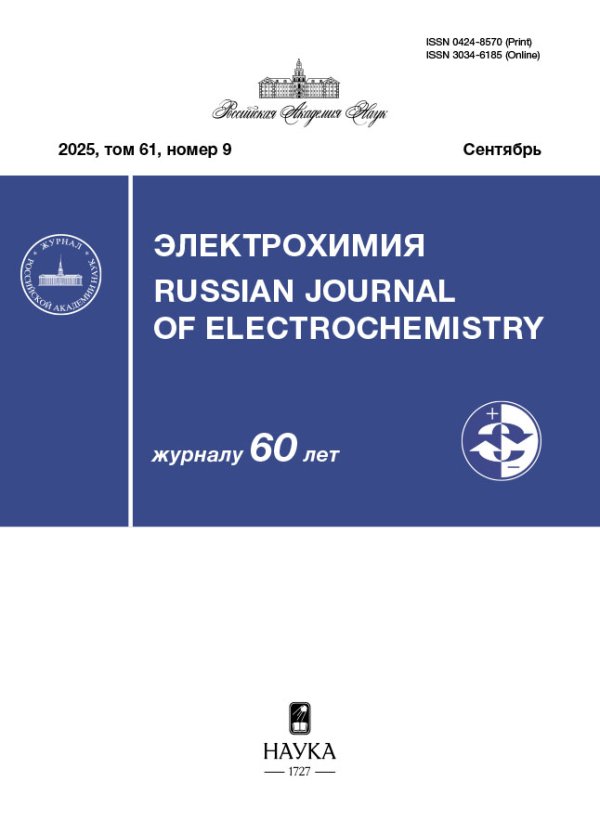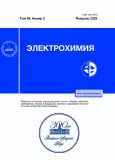Effect of Current Density on Specific Characteristics of Negative Electrodes for Lithium-Ion Batteries Based on Heat-Treated Petroleum Coke
- Authors: Kuzmina E.V.1, Chudova N.V.1, Kolosnitsyn V.S.1
-
Affiliations:
- Ufa Institute of Chemistry, Ufa Federal Research Center, Russian Academy of Sciences
- Issue: Vol 59, No 2 (2023)
- Pages: 101-110
- Section: Articles
- URL: https://bakhtiniada.ru/0424-8570/article/view/139236
- DOI: https://doi.org/10.31857/S0424857023020068
- EDN: https://elibrary.ru/NFCFPF
- ID: 139236
Cite item
Full Text
Abstract
The results of comparative studies of the effect of current density on the average discharge voltage and specific discharge capacity of carbon electrodes based on heat-treated petroleum coke and graphite are presented. The carbon obtained by heat treatment of petroleum coke is shown to have better kinetic characteristics than graphite. The increase in the current density from 0.2 mA/cm2 (36 mA/g) to 2 mA/cm2 (364 mA/g) leads to a decrease in the discharge capacity of heat-treated petroleum coke by 26%; graphite, by 93%. When the current density is restored to 0.2 mA/cm2, the discharge capacity of carbon electrodes is also restored to its initial value. The increase in the current density is also shown to lead to increase in the average discharge voltage of lithium–carbon cells. Thus, with the increase in current density from 0.2 to 2 mA/cm2, the average discharge voltage of the lithium–carbon cells with the electrode active component of the heat-treated petroleum coke increased from 0.39 to 0.62 V; that of graphite, from 0.14 to 0.35 V.
About the authors
E. V. Kuzmina
Ufa Institute of Chemistry, Ufa Federal Research Center, Russian Academy of Sciences
Email: kuzmina@anrb.ru
Ufa, 450054 Russia
N. V. Chudova
Ufa Institute of Chemistry, Ufa Federal Research Center, Russian Academy of Sciences
Email: kuzmina@anrb.ru
Ufa, 450054 Russia
V. S. Kolosnitsyn
Ufa Institute of Chemistry, Ufa Federal Research Center, Russian Academy of Sciences
Author for correspondence.
Email: kuzmina@anrb.ru
Ufa, 450054 Russia
References
- Reddy, M.V., Mauger, A., Julien, C.M., Paolella, A., and Zaghib, K., Brief History of Early Lithium-Battery Development, Materials, 2020, vol. 13, p. 1884. https://doi.org/10.3390/ma13081884
- Broussely, M., Biensan, P., and Simon, B., Lithium insertion into host materials: the key to success for Li ion batteries, Electrochim. Acta, 1999, vol. 45, p. 3. https://doi.org/10.1016/S0013-4686(99)00189-9
- Liu, Y., Li, W., and Zhou, X., An investigation of Li2TiO3–coke composite anode material for Li-ion batteries, RSC Advances, 2019, vol. 9, p. 11710. https://doi.org/10.1039/C9RA02611H
- Maurin, G., Bousquet, C., Henn, F., Bernier, P., Almairac, R., and Simon, B., Electrochemical lithium intercalation into multiwall carbon nanotubes: a micro-Raman study, Solid State Ionics, 2000, vol. 136–137, p. 1295. https://doi.org/10.1016/S0167-2738(00)00599-3
- Химические источники тока: Справочник / Под ред. Коровина, Н.В., Скундина, А.М. М.: Изд. МЭИ, 2003. 739 с. [Chemical power sources: Handbook (in Russian)/ under review N.V. Korovina, and A.M. Skundina. Moscow: MEI, 2003, 739 p.]
- Wang, G., Yu, M., and Feng, X., Carbon materials for ion-intercalation involved rechargeable battery technologies, Chem. Soc. Rev., 2021, vol. 50, 2388. https://doi.org/10.1039/d0cs00187b
- Zhao, B., Ran, R., Liu, M., and Shao, Z., A comprehensive review of Li4Ti5O12-based electrodes for lithium-ion batteries: The latest advancements and future perspectives, Mater. Sci. and Engineering: R.: Reports, 2015, vol. 98, p. 1. https://doi.org/10.1016/j.mser.2015.10.001
- Moshtev, R.V., Zlatilova, P., Puresheva, B., and Manev, V., Material balance of petroleum coke/LiNiO2 lithium-ion cells, J. Power Sources, 1995, vol. 56, p. 137. https://doi.org/10.1016/j.mser.2015.10.001
- Чуриков, А.В., Гридина, Н.А., Чурикова, Н.В., Солопова, Т.А., Форостяный, С.А., Левин, Ф.Ю. Разработка углеродного материала для отрицательного электрода литий-ионного аккумулятора. Электрохим. энергетика. 2001. Т. 1. С. 9. [Churikov, A.V., Gridina, N.A., Churikova, N.V., Solopova, T.A., Forostyanyj, S.A., and Levin, F.Yu., Development of carbon material for negative electrode of lithium-ion battery (in Russian), Elektrohimich. energetika, 2001, vol. 1, p. 9.]
- Alca’ntara, R., Lavela, P., Ortiz, G.F., Tirado, J.L., Stoyanova, R., Zhecheva, E., and Jime’nez-Mateos, J.M., Modification of Petroleum Coke for Lithium-Ion Batteries by Heat-Treatment with Iron Oxide, J. Electrochem. Soc., 2004, vol. 151, p. A2113. https://doi.org/10.1149/1.1814031
- Concheso, A., Santamaría, R., Menéndez, R., Jiménez-Mateos, J.M., Alca’ntara, R., Ortiz,m G.F., Lavla, P., and Tirado, J.L., Effect of oxidation on the performance of low-temperature petroleum cokes as anodes in lithium ion batteries, J. Appl. Electrochem., 2009, vol. 39, p. 899. https://doi.org/10.1007/s10800-008-9735-8
- Чудова, Н.В., Шакирова, Н.В., Кузьмина, Е.В., Колосницын, В.С. Влияние диапазона потенциалов заряда и разряда на электрохимическую емкость нефтяного кокса и графита. Башкир. хим. журн. 2021. Т. 28. С. 85. [Chudova, N.V., Shakirova, N.V., Kuzmina, E.V., and Kolosnitsyn, V.S., Influence of the range of charge and discharge potentials on the electrochemical capacity of petroleum coke and graphite, Bashkirskij himicheskij zhurnal (in Russian), 2021, vol. 28, p. 85.] https://doi.org/10.17122/bcj?2021-4-85-89
- Li, W., Li, Z., Zhang, C., Liu, W., Han, C., Yan, B., An, S., and Qiu, X., Hard carbon derived from rice husk as anode material for high performance potassium-ion batteries, Solid State Ionics, 2020, vol. 351, 115319. https://doi.org/10.1016/j.ssi.2020.115319
- Кузьмина, Е.В., Дмитриева, Л.Р., Карасева, Е.В., Колосницын, В.С. О возможности применения метода сорбции красителей для определения удельной поверхности углеродных материалов для литий-серных аккумуляторов. Изв. Уфим. науч. центра РАН. 2020. С. 29. [Kuzmina, E.V., Dmitrieva, L.R., Karaseva, E.V., and Kolosnitsyn, V.S., On the possibility of application of the method of sorption of dyes for determining the specific surface area of carbon materials for lithium-sulfur batteries, Izvestiya Ufimskogo nauchnogo centra RAN (in Russian), 2020, p. 29.] https://doi.org/10.31040/2222-8349-2020-0-2-29-34
- Lewandowski, A., Biegun, M., Galinski, M., and Swiderska-Mocek, A., Kinetic analysis of Li|Li+ interphase in an ionic liquid electrolyte, J. Appl. Electrochem., 2012, vol. 43, p. 367. https://doi.org/10.1007/s10800-012-0515-0
- Rui, X.H., Ding, N., Liu, J., Li, C., and Chen, C.H., Analysis of the chemical diffusion coefficient of lithium ions in Li3V2(PO4)3 cathode material, Electrochim. Acta, 2010, vol. 55, p. 2384. https://doi.org/10.1016/j.electacta.2009.11.096
- Kaspar, J., Graczyk-Zajac, M., and Riedel, R., Determination of the chemical diffusion coefficient of Li-ions in carbon-rich silicon oxycarbide anodes by electro-analytical methods, Electrochim. Acta, 2014, vol. 115, p. 665. https://doi.org/10.1016/j.electacta.2013.10.184
- Vedalakshmi, R., Saraswathy, V., Song, H.-W., and Palaniswamy, N., Determination of diffusion coefficient of chloride in concrete using Warburg diffusion coefficient, Corr. Sci., 2009, vol. 51, p. 1299. https://doi.org/10.1016/j.corsci.2009.03.017
- Иванищев, А.В., Иванищева, И.А. Ионный транспорт в литиевых электрохимических системах: проблемы и решения. Электрохимия. 2020. Т. 56. С. 1002. [Ivanishchev, A.V. and Ivanishcheva, I.A., Ion transport in lithium electrochemical systems: problems and solutions, Russ. J. Electrochem., 2020, vol. 56, p. 907. https://doi.org/10.1134/S1023193520100055]10.1134/S1023193520100055] https://doi.org/10.31857/S0424857020100059
- Fong, R., U. von Sacken and Dahn, J.R., Studies of lithium intercalation into carbons using nonaqueous electrochemical cells, J. Electrochem. Soc., 1997, vol. 144, p. 1195. https://doi.org/10.1149/1.2086855
- Weibing, X. and Dahn, J.R., Study of Irreversible capacities for Li insertion in hard and graphitic carbons, J. Electrochem. Soc., 1997, vol. 144, p. 1195. https://doi.org/10.1149/1.1837572
- Peled, E., Golodnitsky, D., Ulus, A., and Yufit, V., Effect of carbon substrate on SEI composition and morphology, Electrochim. Acta, vol. 50, p. 391. https://doi.org/10.1016/j.electacta.2004.01.130
Supplementary files















